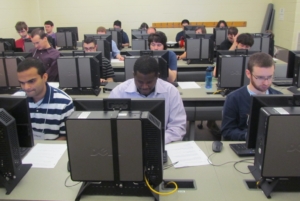

Sex Differences in Autism: What do we know about the female autism phenotype? and Autism in Adulthood: Promising Trends in Employment
September 27, 2019 @ 5:00 am - 8:15 am
Sex Differences in Autism: What do we know about the female autism phenotype?
Friday, September 27, 2019
Program: 9am to 10:30am Registration: 8:30am
Presented By: Julia Parish-Morris, Ph.D.
Villanova University- Health Services Building Room 200
800 E. Lancaster Avenue Villanova, PA 19085
Attendees can attend one program or both, please see the registration page for pricing. Each program is worth 1.5 credits.
1.5 CE Credits
1.5 Act 48 Credits Available
Girls are 4x less likely to be diagnosed with autism spectrum disorder (ASD) than boys, but the reason for this sex disparity is unclear. Researchers have begun to measue how girls and boys with ASD are similar, and how they are different. In this talk, I will describe what we have learned from recent studies of social perception, language, and camouflaging in girls with ASD, and will discuss implications for diagnosis and treatment planning.
Objectives:
- Summarize the diagnostic criteria for ASD.
- Identify weakness in prior research on ASD.
- Identify 2 differences in the way ASD manifests in girls and boys.
Julia Parish-Morris, PhD is a Research Assistant Professor of Psychology with the Perelman School of Medicine and Scientist with the Center for Autism Research at CHOP. Her primary research interests are language development, social attention, and the interactive effects of language and social motivation on higher social cognition (e.g., Theory of Mind). Recent projects include assessing social motivation and language development using infrared eye tracking, studying growth trajectories of receptive and expressive language in preschoolers with autism spectrum disorder (ASD), examining the moderating effects of language on intervention outcomes in 3- to 5-year-olds with ASD, and applying computational linguistics methods to pinpoint a “linguistic signature” of autism – with a particular focus on understudied groups like girls. Dr. Parish-Morris is the recipient of numerous awards and honors, including a Presidential Fellowship, National Science Foundation Graduate Research Fellowship, Autism Science Foundation Postdoctoral Fellowship, American Psychological Association Dissertation Award, Alavi Dabiri Award, and an Award of Excellence from the Center for Autism Research. Her long-term research goals are to identify the mechanisms that underlie pragmatic language impairment and social communication difficulty in neurodevelopmental disorders across the lifespan, chart relationships between these domains and functional impairment, inform individualized treatments, and contribute to early identification efforts. Julia is a member of DBHi and CHOP’s Department of Child and Adolescent Psychiatry and Behavioral Sciences.

Autism in Adulthood: Promising Trends in Employment
Friday, September 27, 2019
Program: 10:45am to 12:15pm Registration: 10:30am
Presented By: Robert Naseef, Ph.D.
Location To Be Determined
Attendees can attend one program or both, please see the registration page for pricing. Each program is worth 1.5 credits.
1.5 CE Credits
1.5 Act 48 Credits Available
With the large cohort of children diagnosed in the 1990’s entering adulthood, autism and related developmental disabilities are a global issue. With unemployment estimated at 70-80 percent, families of teens and adults face a crisis when their children age out of special education and are no longer entitled to services unless they have a cognitive disability. This workshop will focus on promising trends and emerging practices to face this challenge.
Objectives:
- Explain the rapid rise in the incidence of autism spectrum disorders.
- Summarize current research about employment related to ASD.
- Explain why autism is considered a spectrum disorder.
- Summarize the key “soft skills” necessary for pre-employment training.

Robert Naseef, Ph.D. has a distinct voice as a psychologist and father of an adult son with autism. He has spoken around the country and trained professionals internationally in treating autism and other developmental disorders and supporting families. He has a special interest in the psychology of men and fatherhood.
Along with Stephen Shore, Ed.D., Dr. Naseef was a lead consultant to the Arc of Philadelphia and SAP’s “Autism at Work” program which involves collaboration with the Pennsylvania Department of Education and the Bureau of Vocational Rehabilitation. The curriculum they developed, “Preparing Neurodiverse Youth for the Workplace” is available for free download at https://www.neurodiversityarcphl.com/
Dr. Naseef’s 2013 book, Autism in the Family: Caring and Coping Together (Brookes Publishing) integrates advances in research and treatment with clinical experience to help families navigate the emotional landscape and the practical roadmap through the lifespan. Special Children, Challenged Parents: The Struggles and Rewards of Parenting a Child with a Disability (1996), his first book, received international recognition. He has appeared on radio and television. He is the co-editor with Cindy N. Ariel of Voices from the Spectrum: Parents, Grandparents, Siblings, People with Autism, and Professionals Share Their Wisdom (2006).
In 2008, Robert Naseef was honored by Variety, the Children’s Charity for his outstanding contributions to the autism community. He is the social media chair of the Philadelphia Psychology Network. On World Autism Awareness Day, April 2, 2017, Dr. Naseef gave a TEDx talk entitled “How autism teaches us about being human” which you can see on YouTube. Dr. Naseef was recently appointed to the Panel of Professional Advisors of the Autism Society of America. Visit him on the webwww.alternativechoices.com or read his blog at www.DrRobertNaseef.wordpress.com
PSCP: The Psychology Network is approved by the American Psychological Association to sponsor continuing education for psychologists. PSCP: The Psychology Network maintains responsibility for this program and its content.
